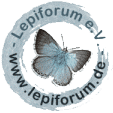

 +27Kontinente:EU
+27Kontinente:EU1. Lebendfotos
1.1. Falter
2. Diagnose
2.1. Männchen
2.2. Weibchen
2.3. Genitalien
2.3.1. Männchen
2.3.2. Weibchen
2.4. Erstbeschreibung
Zwei Jahre später hierzu erschienene Abbildung
3. Biologie
3.1. Nahrung der Raupe
Noch unbekannt! Für die zu findende Behauptung, dass die Raupe im Stängel von Hypericum perforatum leben soll, scheint es keinen konkreten Beleg, sondern nur Mutmaßungen zu geben.
(Autor: Erwin Rennwald)
4. Weitere Informationen
4.1. Andere Kombinationen
- Lita unicolorella Duponchel, [1843] [Originalkombination]
- Eulamprotes unicolorella (Duponchel, [1843]) [bis Huemer & Karsholt (2020) übliche Kombination]
4.2. Synonyme
- Eulamprotes lucentella (Peyerimhoff, 1871)
4.3. Taxonomie
Huemer & Karsholt (2020) nehmen die Neukombination mit Oxypteryx vor, schreiben aber auch, dass noch Fragen offen sind: "Oxypteryx. Eulamprotes Bradley, 1971 with the type species E. atrella is shown to be a synonym of Oxypteryx Rebel, 1911 (Bidzilya et al. 2019), resulting in a number of new nomenclatural changes. We here propose the following new combinations: [...] Oxypteryx unicolorella (Duponchel, 1843) comb. nov. [...] Despite this new taxonomic approach, the genus is in strong need of revision. DNA barcodes separate into three clades seemingly supported by some morphological characters. For example, species formerly considered to be in the E. wilkella-Group and characterized by the blackish ground colour of the forewings with silvery or whitish markings, form a separate clade. Further, the genus has an extraordinary intraspecific barcode variation with 18 sequenced species belonging to 27 BINs, with at least three yet unidentified species."
(Autor: Erwin Rennwald)
4.4. Publikationsjahr der Erstbeschreibung
Woodward (1922: 380) [Digitalisat auf biodiversitylibrary.org] teilt die Publikationsjahre des Bandes mit: 1-112 (mit ?) und pl. 51-56 1842, 113-480 (mit ?) und pl. 57-72 1843, 481-[555] (mit ?) und pl. 73-80 1844, pl. 81-90 1845.
(Autor: Jürgen Rodeland)
4.5. Literatur
- Erstbeschreibung: Duponchel, P.-A.-J. (1842-[1845]): Histoire naturelle des lépidoptères ou papillons de France. Supplément aux tomes quatrième et suivants: 1-554, [555], pl. LI-XC. Paris (Méquignon-Marvis).
- Huemer, P. & O. Karsholt (2020): Commented checklist of European Gelechiidae (Lepidoptera). — ZooKeys 921: 65–140. [zur Arbeit und PDF-Download auf zookeys.pensoft.net]
- Woodward, B. B. (1922): Catalogue of the Books, Manuscripts, Maps and Drawings in the British Museum (Natural History). Vol. VI. Supplement: A–I: i-iv, 1-511, 1-48. London.




























































